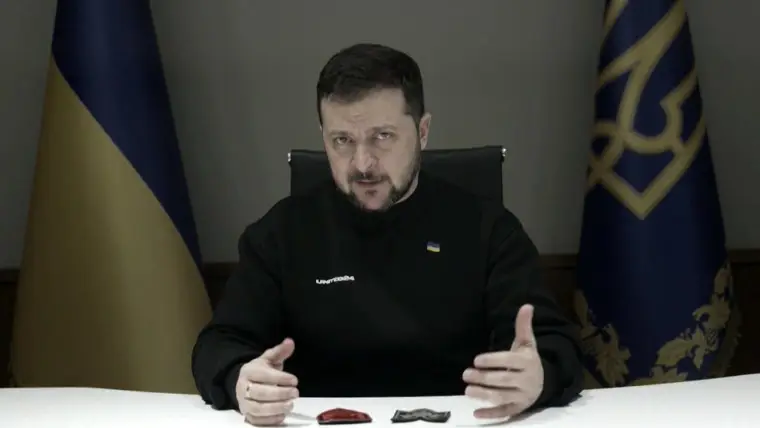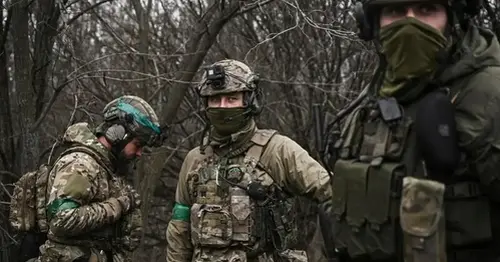
Has Ukraine made a mistake by refusing to retreat from Bakhmut?
Ukraine says its future may depend on the brutal battles currently raging around Bakhmut, but there are growing splits between officials in Kyiv and some Western military analysts over the best approach to what could be a decisive period in the conflict.
For months, Ukraine’s defense of the eastern city has held up and worn down Russian forces while serving as a potent symbol of the country’s defiance.
Now, as Moscow’s assault intensifies, a number of observers have questioned whether Kyiv's decision to reinforce the area rather than retreat is being driven more by the political desire to avoid a high-profile defeat than by military logic.
A long-speculated Ukrainian withdrawal from the battered city has not materialized, with President Volodymyr Zelenskyy and his military chiefs instead betting that they can buy critical time and benefits for a future counteroffensive by doubling down.
Ukraine's military chiefs united in defending Bakhmut, Zelenskyy says
March 15, 202300:43Russian forces, led for months by mercenary fighters from the Wagner private military company and reinforced by newly mobilized reservists, have intensified their winter campaign to seize the city despite taking massive losses.
It's a key prize for the Kremlin and capturing it would be Russia's first major victory in nearly a year.
That unceasing pressure has left Ukrainian troops surrounded on three sides and facing an increasingly dire situation.
“Ukrainians should have pulled back weeks ago,” defense analyst Konrad Muzyka, the director of Rochan Consulting, based in Poland, which specializes in Russia and Belarus, told NBC News.
"It just doesn’t make sense to defend the city right now," said Muzyka, who recently visited the area with colleagues.
He was outlining a view that has become increasingly common among some close observers of the conflict: The defense of Bakhmut was crucial both strategically and symbolically, but the situation has deteriorated to the point that it may now be more costly than it is worth.
Kyiv was now suffering such heavy losses, Muzyka said, that it could be setting back its own hopes of successful advances in the future.
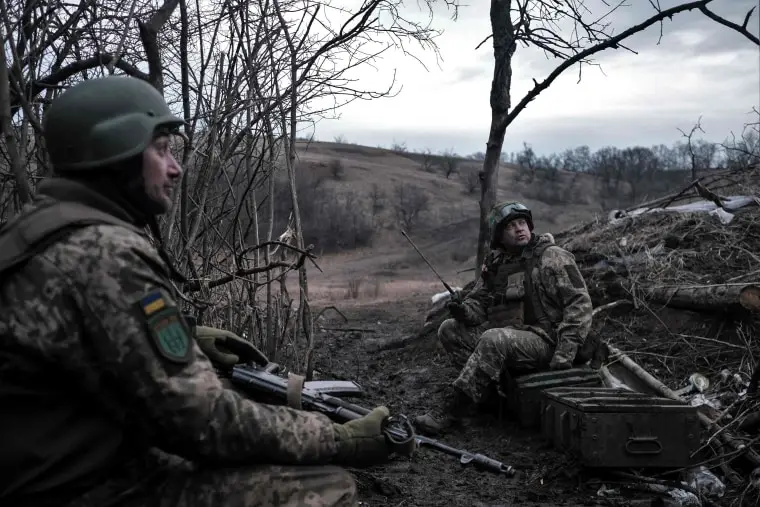
There is now just one main road out of Bakhmut under Ukrainian control, with the mining hub that was once home to around 80,000 reduced to artillery craters and muddy trenches.
But Ukrainian officials have doubled down on their strategy, insisting that holding the city was in fact critical to their future operations even as losses mount on both sides.
Ukraine’s future hinges on the outcome of the battles raging in Bakhmut and nearby areas, Zelenskyy said this week, as he underscored his commitment to holding out in the city.
“There was a clear position of the entire command: Strengthen this sector and destroy the occupiers to the maximum,” he said in his nightly video address Tuesday.
Officials in Kyiv have insisted the battle both restricts Russian advances by forcing Moscow to throw troops and equipment into Bakhmut, while laying the ground for future Ukrainian advances by allowing their own reserves more time to prepare.
Their position was given public backing in Washington on Wednesday.
"Ukraine has fixed the Russian forces at that city and they're exacting very heavy costs on the Wagner Group and the Russian regular military," the chairman of the Joint Chiefs of Staff, Gen. Mark Milley, told a news briefing.
NBC News has reached out to the Ukrainian government for further comment.
For its part Moscow hopes Bakhmut could open a path to capturing the rest of its surrounding region. The city lies in the northeastern part of Donetsk province, one half of Ukraine’s industrial Donbas heartland that has become the central target of the Kremlin’s offensive.
With that in mind, some analysts said Ukraine’s approach made sense.
“The idea of the Ukrainians is not just to kill as many Russians as possible, but to fix their troops there so they cannot deploy them anywhere else,” said Rajan Menon, a director at the Washington think tank Defense Priorities, adding that Ukraine was well aware of its position in Bakhmut and was taking a calculated risk.
“The question is if you can hold the line and inflict damage with a cost that the commanders in Ukraine deem as acceptable,” Menon said, “is it necessarily a disastrous thing to do?”
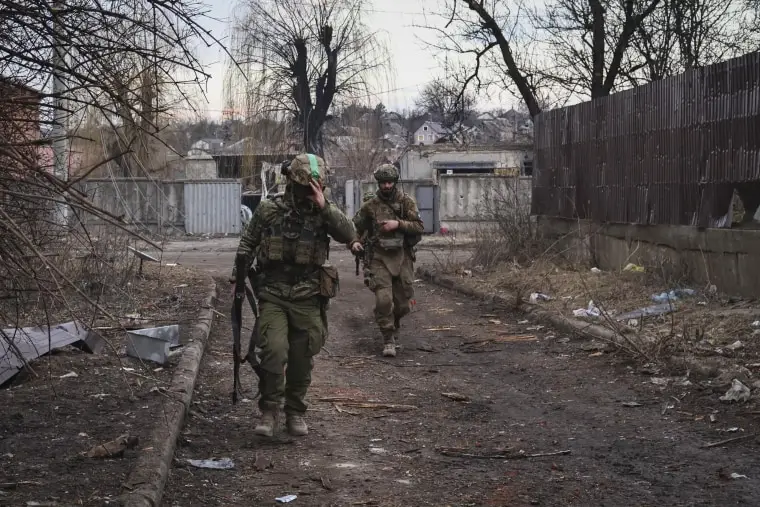
Russian forces have relentlessly bombarded the city with artillery and waves of infantry attacks, increasingly thrusting new recruits and even some of their best forces into the fight alongside the ex-convicts and mercenaries of the Wagner group.
Led by longtime Putin ally and oligarch Yevgeny Prigozhin, Wagner has taken scores of casualties for every small fraction of land seized, according to analysts.
They now control most of eastern Bakhmut, with a river flowing through the city becoming the front line, according to the Institute for the Study of War, a Washington-based think tank.
Ukraine’s limited resources might therefore be better spent elsewhere, Muzyka and others posit, with the determination to cling to an increasingly perilous position in Bakhmut also threatening its ability to defend other positions in the area.
Bakhmut has become a fortress of symbolic value akin to Mariupol, with its survival a point of national pride. But the fight there also carries weight inside Russia, where Prigozhin has emerged as a face of the war and has engaged in a public feud with Moscow's military leaders.
The Wagner chief has accused the Kremlin's top brass of failing to adequately supply his fighters with ammunition and played up the ferocity of the Ukrainian defensive effort as he seeks a high-profile victory.
Securing Bakhmut is now critical for Prigozhin, experts said.
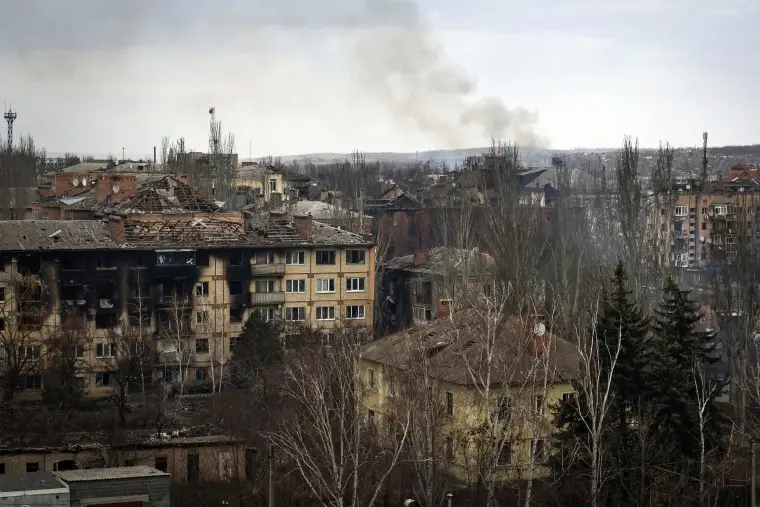
“He’s succeeded, in fact, to turn this very challenging battle into something that, in fact, benefits him,” said Tatiana Stanovaya, a nonresident scholar at the Carnegie Endowment for International Peace and the founder and head of the political analysis firm R.Politik.
But Ukraine’s persistence has resulted in a heavy toll for the Russians.
In one video shared by Sota, an independent Russian media outlet, a group of women who say they are the mothers and wives of men from one division sent to fight in the east plead with President Vladimir Putin to bring home those who have been “thrown like meat to storm the fortified areas.” NBC News has not verified their claims.
However, officials in Kyiv may not be the only ones hoping that the brutal battles keep going.
Some of Moscow’s military leaders may be eager for Ukraine to keep up its defensive efforts, Stanovaya suggested, so that Prigozhin sees his forces depleted and with it his influence weakened.
“It’s useful that Ukrainians decide to stay because like this, they will just waste all Wagner’s people,” Stanovaya said.
The Wagner offensive on Bakhmut "appears to be nearing culmination," the ISW said in an update Wednesday that supports that idea. "Manpower, artillery, and equipment losses" will likely constrain the group's "ability to gain substantial territory in battles for urban areas," the ISW added.
Source: https://www.nbcnews.com/news/world/ukraine-mistake-bakhmut-defense-retreat-russia-wagner-rcna74618
